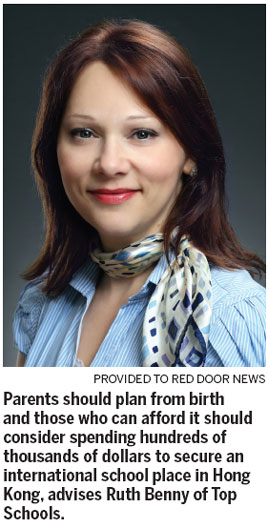The multi-million dollar scholars
Updated: 2012-10-04 05:53
By Simon Parry(HK Edition)
|
|||||||||
|
The scarcity of places in ESF and international schools in Hong Kong is driving some professionals away from the city to places like Singapore, chambers of commerce warn. Provided by Red Door News |
With international school debentures selling for millions of dollars and priority places in the English Schools Foundation network on sale at HK$500,000 per child, there are fears that the scarcity and price of international school places is driving people away from Hong Kong. Are those fears justified, asks Simon Parry?
When the head of the English department at Hong Kong's Baptist University interviews overseas candidates for a new teaching position, some applicants will find themselves at the receiving end of some rather blunt advice.
"I am going to advise people if they have kids to think very hard before they come," said Associate Professor Hans Ladegaard. "I will probably be very frank and say 'Don't come because you can't afford it'."
Ladegaard, a Danish father-of-three who arrived in Hong Kong in 2005, is particularly well qualified to give advice. As head of the ESF (English Schools Foundation) Concerned Parents Group, he has battled in vain for years against the rising cost of schooling in Hong Kong.
Now, with international school places in short supply and the government-subsidised ESF introducing a new HK$500,000 Nomination Rights scheme that gives children priority placement, he believes the battle is all but lost.
"We have been talking to deaf ears," he said. "Senior management is certainly not interested in what we are saying and the same is true of the government and the people we have seen on the LegCo (Legislative Council) education panel.
"We are disillusioned because things are moving in the wrong direction but there isn't much we can do about it. The concerned group is still here but we are dormant. We are under no illusions that we can accomplish a lot because we are fighting against the odds."
Ladegaard said he was "not surprised but saddened" by the introduction of the HK$500,000 Nomination Rights scheme. "It is uncalled for," he said. "It seems to be another step towards privatisation.
"It is catering to the rich. Affordability used to be one of the pillars of the ESF. They used to be schools where lower middle-class families could get their kids in if they couldn't access the local curriculum.
"Now, you can't get your children into ESF schools, and even if you can get them in, you can't afford it. There seem to be more and more schools catering to the rich and there seems to be nowhere for ordinary people to send their children.
"We know of a number of parents who have left - people who have their own companies, small and medium-sized businesses, parents who have found they just can't afford it anymore.
"It's sad, isn't it? You have talent. You have people who want to be here and who want to work for Hong Kong and then eventually they give up because there is nowhere for their children to go. It is going to have a long-term impact on Hong Kong. A lot of people won't come here because it's just not possible."
The shortage of international school places in Hong Kong - sharpened by soaring demand from local and mainland families - has triggered similar warnings from overseas chambers of commerce who fear it will make the city less competitive.
In a paper to the government last year, the American Chamber of Commerce said of the shortage of international school places: "We feel the situation is hitting a crisis point now. The government urgently needs to work with the private sector to set coherent and long-term sustainable policies to support Hong Kong's education and talent development."
Christopher Hammerbeck, executive director of the British Chamber of Commerce, said: "The Singapore newspapers were absolutely full of the fact that there was a big problem in Hong Kong over international school places last year.

"Anecdotally, I know of one big company here which had to put a senior director in Singapore because he had three children and couldn't get them into the same school here. Another big British institution was only posting people here who did not have children."
He argued: "This has struck at the very heart of the competitiveness of Hong Kong as an international financial center. We want people to come here and we want them to come here for all the right reasons. Education is an issue that needs to be dealt with."
The school places issue had become more acute because of an increasing influx of foreign nationals, said Hammerbeck. "Europe has been going through a fairly tough time," he said. "There has been a perception since two to three years ago that the global center of gravity was swinging towards Asia, and so the consequence of that has been the arrival of more companies.
"We have certainly seen a steady inflow of British companies over the last three years. It is unabated and it is still happening. There has also been a tremendous inflow of French and also of Italians and all sorts of different nationalities."
However, partly because of the pressure from international chambers of commerce, the situation regarding international school places was now "rather brighter", Hammerbeck said.
"First of all Harrow International School has come on stream at the beginning of this academic year," he said. "Progress is now forging ahead both with the construction of Kellett International School in Kowloon Bay and the Hong Kong Academy in Sai Kung. Those will create significant numbers of new places both in secondary and primary.
"In addition to that, because of the lobbying which we started and which managed to get all the international chambers to come in with, the government has now identified four redundant state schools and is going through an expression of interest process at the moment.
"We happen to know that there are a significant number of really highly reputable school operators who are bidding for these primary schools. There will be two on the island and two in Kowloon Bay and I think that will do a lot to address the immediate issue."
Hammerbeck said: "I am actually very positive. I think the government, to be fair, has taken the right steps to deal with the shortage of primary places. Provided these four new sites come on stream in the next 12 months, it will go a long way towards dealing with the problem."
The shortage of international school places has made an instant success of Ruth Benny's company Top Schools, which she set up in February and which helps parents find schools for their children. "I have hit on a niche and I'm extremely busy," she said.
Benny, a Briton who has lived in Hong Kong for 20 years and has two children of her own in the international school system, specialises in helping long-term expatriates living in Hong Kong to find school places for their children.
The shortage of places had been somewhat exaggerated by people with vested interests, she argued, saying that if people were flexible and planned well ahead, they should be able to secure school places for their children.
"If parents think about it early and think strategically and can accept flexibility, we can always find places for their children," Benny said.
"It's only a problem when you have parents who say 'I won't move from Robinson Road and I don't want my child to travel more than half an hour to school, I want them to be bilingual and I don't want them to have any homework.
"I have to work with parents to manage their expectations because there are a lot of unrealistic expectations."
The Top Schools website lists the price of international schools across Hong Kong as well as the price of debentures which can cost from HK$100,000 to HK$10 million. "Most (debentures) are sold out and companies hold them," Benny said. "Companies have a portfolio of debentures.
"There aren't many on the market. Two weeks ago, one came up for sale. The father had paid maybe HK$4 million and the kid didn't pass the assessment and so he didn't get in. The debenture was sold on for HK$4.5 million. The family was quite well known and the poor guy was a bit embarrassed."
Benny said: "Parents should plan from birth. At some institutions you have to sign children up from six months or from birth. I have pregnant women coming to my seminars and I like to see that. Early planning is important."
As far as the price of schooling was concerned, Benny advised parents to pay for a debenture or a Nomination Right if they could afford it. "If you're thinking of having children you'll know children are not cheap and hopefully you start saving immediately," she said.
"A lump sum of say HK$450,000 isn't too difficult to achieve. Once you have children, if you have the money you won't resent paying it. You have to play the game.
"You may not agree in principle that the school is charging this debenture, but at the end of the day you have to take the view 'It's my child's education and I am going to amass this sum of money and I will suck it up and pay'. If your child is going to stay in that school for 12 years it's not an awful lot over the 12 years."
"If you are spending HK$120,000 a year on education anyway, then to have a lump sum of HK$200,000 or HK$400,000 isn't a big ask."
In Ladegaard's view, however, the rising fees and eye-watering down-payments for semi-guaranteed places are ensuring that Hong Kong's international schools cater for an increasingly exclusive market.
"If you have a big multi-national corporation behind you, that's okay because they will probably pay for you children's education," he said.
"But there are a lot of people who make a significant contribution to Hong Kong - police officers, university professors, NET (Native English Teacher) teachers - who simply won't be here in future unless the government provides us with affordable English language education.
"It seems the government just doesn't care anymore. It feels as if we have nowhere to go."
(HK Edition 10/04/2012 page4)
